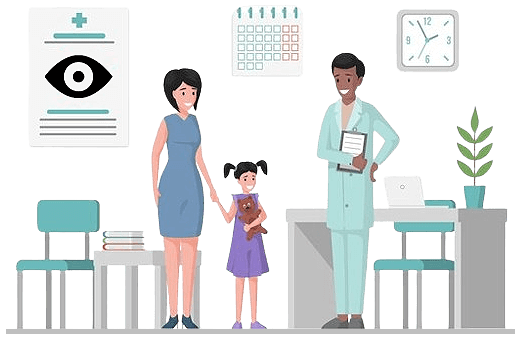MAKE APPOINTMENT

Welcome to Neuro Vision Specialist Therapy Center! Whether you’re facing vision challenges, seeking neurological therapy, or aiming to optimize your visual performance, our team is here for you. Make an appointment with us today!
F.A.Q.
Frequently Asked Questions
Is it possible for Johnny to have a vision problem if the eye doctor confirmed that he has 20/20 vision?
The measurement of 20/20 vision simply indicates the ability to see the appropriate letter size on an eye chart from a distance of 20 feet. However, this test does not assess all the essential visual skills necessary for reading and learning.
What kinds of therapy might be suggested as potential treatments in the event that an issue is identified?
The Neuro-Developmental & Behavioral Optometrist may propose various approaches based on the severity of the issue. These could include adopting a “watch and wait” strategy, utilizing specialized therapeutic lenses, or implementing a more intensive treatment plan that involves vision therapy.
At what point should you arrange an appointment with NVS?
If your child is experiencing difficulties related to reading or underperforming despite other attempted approaches like tutoring, dietary adjustments, or medication, it is essential to address any underlying vision problems. Without adequate visual skills, it becomes challenging for your child to comprehend what they are reading, and the struggles will persist until the vision problem is resolved. Therefore, we strongly recommend considering scheduling a Neuro-Developmental vision evaluation if your child is facing reading challenges or is not achieving their full potential.
Is Neuro-Vision Therapy a recent development?
While vision therapy is an optometric specialty that enhances visual function and performance, its roots can be traced back to orthoptics. Orthoptics, initially introduced by physicians in the late 1800s, aimed to correct misaligned eyes. However, as the medical field increasingly emphasized eyeglasses, medication, and surgical interventions, the teachings of orthoptics became less widespread. Nonetheless, optometrists in the mid-1900s embraced the valuable aspects of orthoptics and played a crucial role in advancing the field of vision therapy.
What is the mechanism behind Neuro-Vision Therapy?
Similar to other skills, visual skills can be developed and improved through appropriate therapeutic techniques. In Neuro-Vision Therapy, the optometrist designs visual tasks that are practiced under controlled conditions with the guidance of a vision therapist. By repeating these tasks, vision is enhanced through the coordination and improvement of eye movement, focusing ability, and the alignment of the eyes.
What distinguishes a Neuro-Developmental visual evaluation from a regular annual eye examination?
While an annual eye exam primarily aims to ensure optimal eye health and determine the necessity for corrective eyewear like glasses or contacts, a Neuro-Developmental visual evaluation picks up where the general examination concludes. Our practitioner specifically assesses issues related to eye movement, eye coordination, and other subtle problems that may impede reading and learning.
What does Neuro-Vision Therapy entail?
Neuro-Vision Therapy is a personalized treatment program that involves specific eye exercises and specialized equipment. Its purpose is to assist patients in learning proper eye utilization and enhancing their comprehension of visual information.
Who would benefit from Neuro-Vision Therapy?
To ascertain the necessity of Vision Therapy, the initial step involves arranging a Neuro-Developmental vision evaluation. Prior to prescribing this form of therapy, our Behavioral & Developmental Optometrist considers many factors to assess if ones would benefit from therapy treatment.
What does participation in a Neuro-Vision Therapy Program involve?
Each patient receives a personalized Neuro-Vision Therapy program tailored to their specific needs. Typically, in-office therapy sessions are scheduled once a week. Additionally, patients are provided with a set of exercises to perform at home, reinforcing the skills learned during the office sessions. Dedication to the therapy program and maintaining a consistent schedule of office visits are crucial for the program’s success. For patients who cannot visit the office frequently, certain binocular vision problems can be addressed through an at-home training program conducted on a computer. These programs are designed to target individual weaknesses and can be monitored by the Behavioral & Neuro-Developmental Optometrist.
Will Neuro-Vision Therapy last?
Upon completion of the program, the advantages of Neuro-Vision Therapy are expected to endure throughout one’s lifetime. The ability to focus accurately and utilize both eyes efficiently becomes a reflex that functions effortlessly once conditioned. At the conclusion of each therapy program, self-monitoring activities are recommended. Non-medical Neuro-Vision Therapy, particularly concerning visual perception, equips children for lifelong learning while also addressing gaps in visual skills and abilities for many adults.
Evaluate Vision Problems
Functional Vision Disorders or Visual Dysfunction are the terms used to describe vision problems that many children and adults experience, but they often fail to recognize that these challenges in the classroom or workplace have no connection to their intelligence or efforts. Rather, the root cause lies in their inability to visually process the information presented to them. Find out potential vision problems with self evaluation below.
